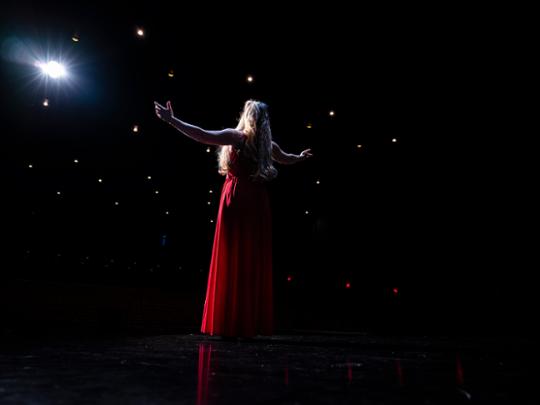Texas Tech alumna Amanda Key demonstrates why determination, perseverance and hope will always matter.
She can see clearly now that most of the pain is gone. At least some of the obstacles are no longer in her way.
The days are brighter, maybe even bordering on sunshiny from time to time, but it has not been easy for Amanda Key-Braster to see the light – even as someone who possesses a singing voice so beautiful it can cause songbirds to doubt their vocation.
For a dozen years, Amanda’s vocal talent mesmerized crowds and pleased opera enthusiasts across Europe as the coloratura soprano performed not only in numerous productions but also in several hundred cathedrals across Belgium and the Netherlands.
Until she didn’t.
And in what may have been the cruelest of twists, she never saw it coming.
“It’s kind of a tragic story,” she reflects in a melancholy way, memory carrying her back to the moment when her life was cleaved into before and after.
Overture
[ oh-ver-cher, -choor ] noun. Music. An orchestral composition forming the prelude or introduction to an opera, oratorio, etc.
When performing on stage and in cathedrals around the world, she is billed as Amanda Key. The rest of the time and especially now, as wife and mother, she is known as Amanda Key-Braster.
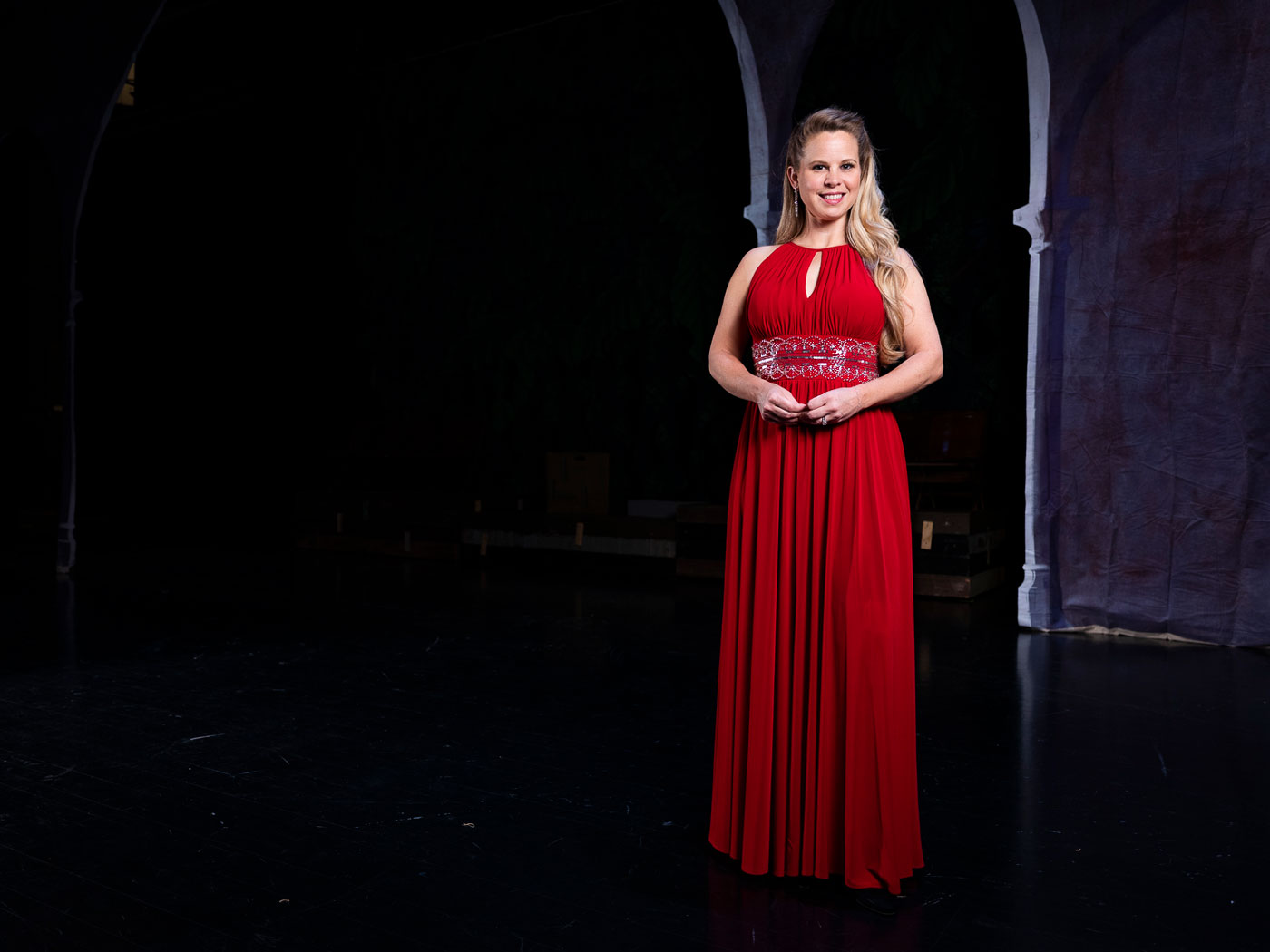
Amanda’s love affair with music is so deeply ingrained within her it might as well be part of her origin story.
“My mother used to say I came out singing,” she jokes. “She said I could sing before I could talk, and I was a very musical baby.”
It wouldn’t take great detective work to discern that she was incredibly gifted musically. As a child, she was introverted and preferred singing to talking. Her first solo performance came as a sixth grader in school, singing “America the Beautiful.” She took to instruments with a similar zeal, beginning with piano before moving to flute and eventually settling on percussion instruments.
“All through junior high and high school, I was in choir and band,” she said. “In high school, I also joined orchestra and musical theater. By the time I made it to Texas Tech, it was already clear that my passion was music and I wanted to perform.”
That desire came even more clearly into view when Amanda began attending Coronado High School in Lubbock.
“Amanda was in choir during what I consider to be some of our most successful and productive times at Coronado,” said Brett Farr, the former longtime director of choir at the school. “Amanda was one of those students who was always engaged and was intentional about her participation in choir. She was sincere and an incredibly hard worker.
“Interestingly, she did not try to be a star. She was content to be one of the group, but there was no way to really hide her wonderful talent.”
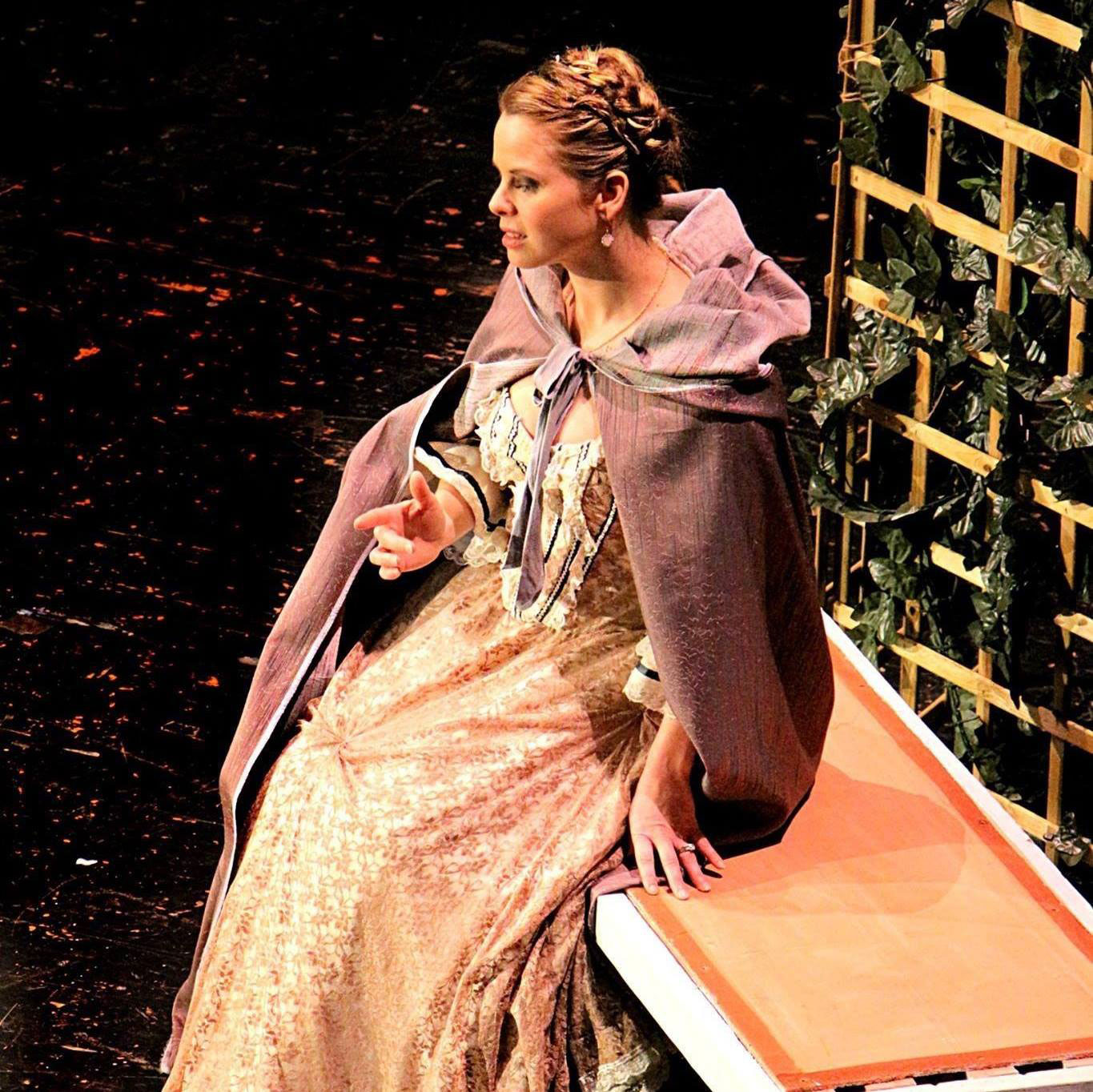
After graduating from Coronado in 1998, she decided to focus on voice while playing percussion on the side. She knew she wanted to sing, but opera? That wasn’t even on Amanda’s performing radar.
That decision ultimately would be made at Texas Tech University’s School of Music.
“It was a clear choice that I wanted to go to Texas Tech because I grew up in Lubbock and I love Texas Tech,” she said.
“I was focused on voice, and my first-year voice teacher, Professor Kathy McNeil, asked me about opera. I didn’t know anything about it, but she told me, ‘Well, your voice would be perfect for opera.’”
Amanda started asking more questions about opera. Certainly, she could see herself singing in Broadway musicals such as “Cats” and “Les Misérables,” but opera was, in her mind, something else altogether. She decided to follow her curiosity and took the plunge.
It was a choice she would never regret.
“My voice teacher talked me into trying out for the opera, and I made it,” Amanda said. “So, the first opera I ever saw, I was in. And it happened to be with professor Gerald Dolter, who directed the opera program at Texas Tech. His very first opera at Texas Tech, ‘The Merry Wives of Windsor,’ was my very first opera.”
Arriving on campus, she studied voice and was involved in the steel drum band and percussion ensemble. This was also where her life initially intersected with Dolter’s. He became a mentor and helped her decide which path to follow.
“We met when she was a member of my introduction to opera theater class,” recalled Dolter, who has trained generations of singers through almost 30 years at Texas Tech and more than 40 in higher education. “There were a lot of good people in that class, and Amanda was one of the best. She asked a lot of good questions, and she excelled in the class.”
That excellence wasn’t simply because of the superior quality of Amanda’s voice, although that certainly helped distinguish her from the crowd. Dolter classified her vocally as a soubrette soprano – light with a bright, sweet timbre – during this phase of her life, but her voice would continue to mature with time and experience.
“I actually didn’t grow into my voice until I finished my master’s degree in Amsterdam and found a new voice teacher,” she said. “I worked with Raymond Modesti, who is the artistic director of the Belcanto Academy, and he was the one who transitioned the way my voice was classified into a lyric coloratura soprano.”
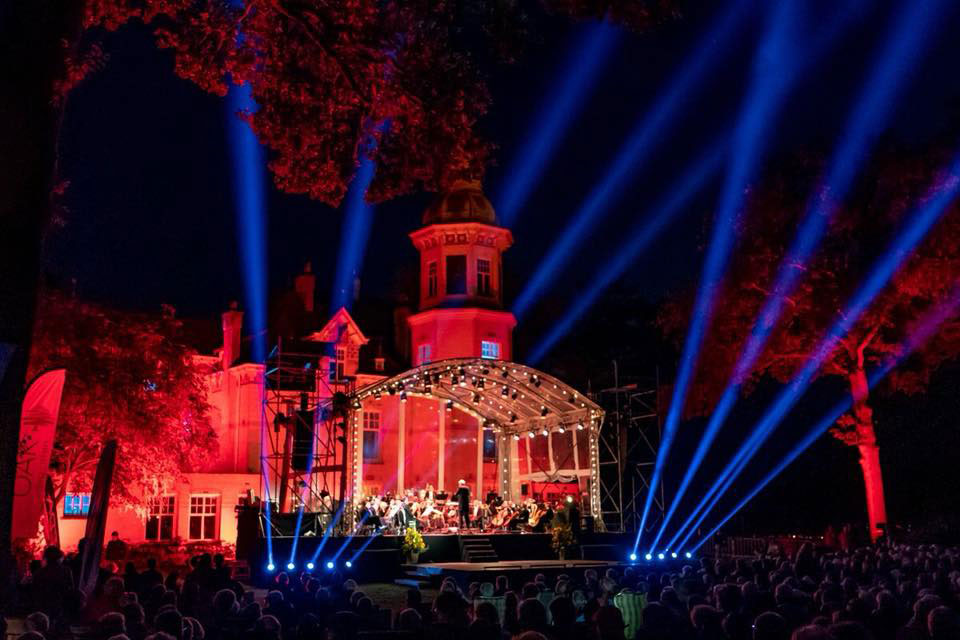
Right away, Modesti could tell Amanda had the skill and talent to grow vocally, and he helped further sharpen her marvelous gift.
“Amanda is a very bright and receptive student and soon enough she saw that the bel canto method of singing helped get the voice connected and filled out,” Modesti said. “The voice developed from a light soubrette-ish-like soprano to a full lyric coloratura. Amanda is a very receptive student. Her sense of musicality and humor made our lessons a sheer joy.”
Aria
[ ahr-ee-uh, air-ee-uh ] noun. Elaborate melody sung solo with accompaniment, as in an opera or oratorio.
“What separates the operatic sound from all the rest is the overtone series in the voice,” Dolter said. “I listen for that as a voice teacher, the overtones, the timbre. It is unmistakable. Amanda has the overtone capable of carrying over an orchestra without amplification.”
That would become important because opera singers traditionally do not use microphones when they perform. Dolter noticed other memorable characteristics about Amanda as well.
“Amanda has something else that makes her a success: She doesn’t take no for an answer,” he said. “I remember I spent one class talking about my personal performing journey with the Bremen Opera in Germany. That piqued her interest. She asked important questions about how to do this.”
Among Dolter’s impressive bona fides are appearances with eight German opera companies and serving as Bremen’s leading baritone from 1985-91. Those professional adventures resonated with Amanda, who saw Dolter’s somewhat nontraditional route as a realistic pathway to realizing her own opera dreams.
“He was the one who inspired me to go to Europe and sing opera,” Amanda said.
However, it takes more than quality of voice to reach such accomplished heights. Equally important is strength of character and depth of determination.
“You can have all the voice in the world, but if you don’t have the drive and you say no too easily to hardship when life gets in the way and takes you a certain direction, you will not get there,” Dolter said. “She never gave up on the dream or the drive to get there. Every singer who’s made it that I’ve taught over almost 40 years of doing this, it was not accidental.
“When the door opened, they were willing to walk through it. They didn’t know all the answers. They just knew they had this goal in mind and would do whatever it takes to accomplish it. Amanda walked through that door.”
And she was taking that stunning voice with her. As a coloratura soprano, Amanda was perfectly suited for a career in opera. As Dolter described, “They have stratospheric high notes and a good lower range.”
While there are outstanding opera teachers throughout America, and obtaining training of the highest caliber is achievable, finding a place in an opera company isn’t easy. The opportunities are limited, and the competition is ferocious.
In Europe, though, it’s a slightly different story. Most communities of any size have their own opera company and stage spirited and robust productions throughout the year. To kickstart her career, Amanda decided her best option was across the Atlantic.
“I was here in Lubbock and Gerald Dolter told me that he sang all over the place in Germany,” she recalled. “I said, ‘I want to do that.’ I told my friends and family that I was going to go sing opera in Germany … and they thought I was crazy.”
Crazy, like the professional poker player who can survey the competition around the table and instantly sense favorable odds. Amanda knew great talent harnessed to that same relentless work ethic that helped her earn a bachelor’s degree in vocal performance would be a tough combination to beat.
“Many students come and go over the years, but a few stand out because of their extraordinary behavior,” recalled Farr, who taught her in high school. “What I remember about Amanda was she had a beautiful voice, was extremely dependable, and every time I looked her way, she zeroed in on what was being asked of her. She had great maturity and determination for her age.”
Amanda is also a student of her art, and the more she learned about opera, the more she wanted to learn. As her knowledge grew, so did her appreciation.
“I fell in love with it,” she said. “I’m also kind of a history geek, and I thought it was very cool that we would perform operas from the 1800s and bring them on stage. So, when I started, I fell in love with the acting, costumes, history and the technique. In my eyes, it was superior to simply singing in musicals.”
As Dolter had done a couple of decades earlier, she set her sights on Germany, but that isn’t where she started.
“My boyfriend at the time, who is Dutch, said, ‘What about the Netherlands?’” she said, referring to Berry, now her husband of 10 years. “We moved to the Netherlands, got married and were about a two-hour drive from Germany. Our daughter was born in Amsterdam, and we lived there for 12 years.”
German operas are performed in German, which means it became incumbent upon Amanda to master the language.
“I took Latin in high school and two years of German at Texas Tech,” she said. “When I moved to Europe I did three full weeks of intensive courses in Cologne, Germany, so that I could be completely immersed in the language. I also became fluent in Dutch, took one year of Italian and a few French classes. As an opera singer, you need all of these languages.”
As an American, it would be a challenge breaking through and landing roles in European productions, and it would be impossible without overcoming the language barrier.
“It’s difficult to make it into the system as a foreigner,” Dolter said. “Part of it is the language. You have to be fluent to make it. Is it a challenge? I would say yes, but in the same breath I would say the cream rises to the top.”
It was, to paraphrase a song from another genre, close enough to perfect for her. Amanda completed her master’s degree at the Conservatory in Amsterdam and then co-founded a Dutch opera company called B.O.O.M! (Bold Opera on the Move), of which she was also named artistic director.
“I had this huge vision of bringing opera to the people, especially people throughout the Netherlands,” she said. “There wasn’t a whole lot of opera besides in Amsterdam and a few traveling operas. They tend to perform a lot more oratorios in Latin there.”
These were some of the most precious and memorable days of an ascendant career. Amanda sang in 11 countries, performing some of the world’s best-known operas in historic venues across Spain, Greece, Italy and Germany. Some of her highlights include main roles such as Susanna in Mozart’s “Le Nozze di Figaro” and Gilda in Verdi’s “Rigoletto.”
Everything was coming together.
“It starts with the voice, but you have to have the language and the drive,” Dolter said. “You have to be able to successfully assimilate into a different society. You have to have your stagecraft ready to go, and you have to be willing to continually learn.”
And you’d better be willing to pay the price day after day after day for years at a time.
“Students like Amanda who have gone on to great success share attributes of self-confidence, dedication, commitment, self-awareness, stick-with-it-ness and a unique ability to rebound when things are difficult,” Farr said.
Amanda had prepared all her life to meet these moments.
“Determination and grit are what I needed,” she said. “I always had to work a little harder because singing opera didn’t come quite naturally to me. But I am also the type of person who if you tell me that something is not possible, then I’ll work even harder to prove you wrong.
“The first time I auditioned for a German agent, they told me no. They said I had great potential and to come back next year, so I worked very hard with my opera coach, Ira Siff, who is the Met Live commentator for the New York Metropolitan Opera. The next year I came back and auditioned for them again, and they took me on, and I was represented in Berlin and Hamburg.”
Siff said Amanda’s attention was completely riveted on further developing her already considerable talent.
“Amanda worked very, very hard, focusing on aspects of her presentation that needed improvement,” he said. “She was never defensive, always willing to take technical and interpretive suggestions, knowing that they came from a place of being on her side, wanting the best for her.”
That determination was an attribute that one day would serve her well in ways she never knew she would need.
Libretto
[ li-bret-oh ] noun. The text or words of an opera or similar extended musical composition.
First, though, there was evangelizing that needed to take place as Amanda worked to share the gift of opera with as many people as possible in her new country.
“I was traveling to Germany to do operas,” she said. “But I wanted to spread the good news of opera in the Netherlands. My idea was to bring it to the people, and with B.O.O.M! that is what we did.”
The production company would take a three-hour opera and reduce it by half to introduce the uninitiated to the art form without overwhelming them or being too demanding of their time.
“Maybe they had never seen an opera before,” she said. “We wanted to help people learn about it and become more accustomed to it, so we would stage festivals in parks, theaters and schools – places where people were going to be anyway.”
The work was demanding, but the travel was fantastic. Amanda saw some of the world’s most beautiful cities and worked with a variety of artistic temperaments.
“Let’s just say that some of the singers and directors are not always the easiest people to work with,” she laughed. “But I really enjoyed my time in Europe. For 12 years, it was a lot of fun.”
Opera was only part of the appeal. She also performed oratorio and church music as a soloist in several hundred cathedrals across Belgium and the Netherlands.
“The acoustics are amazing, and the organs are very majestic and beautiful,” she recalled. “Part of the beauty and admiration comes from the architecture. Some of those cathedrals were built between 1200 and 1500.”
In those sacred and awe-inspiring spaces, she has performed selections ranging from Handel’s “Messiah” to Bach’s “St. Matthew Passion.” She says Smetana Hall at the Prague Municipal House in the Czech Republic remains the most beautiful place in which she sang.
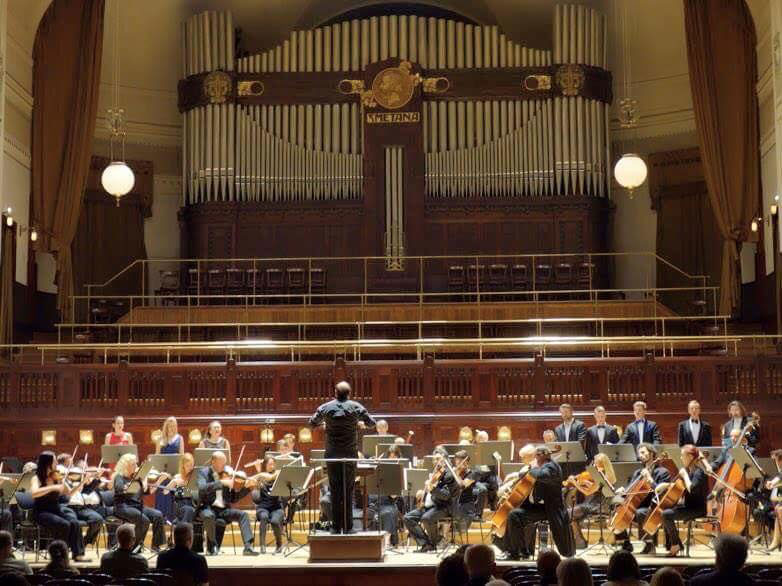
The contrails of a stunningly successful career were now plainly visible, outlined against a skyline of achievement. She refused to be denied. It’s easy to see Amanda now filled with Oz-like wonder looking back at this amazingly gratifying stretch in her life and thinking: “I’ve a feeling we’re not in Lubbock anymore.”
And then everything changed.
It has been six years, but the memory remains seared into her soul. The place is Amsterdam during a rehearsal of “The Magic Flute.” Amanda is playing the Queen of the Night character, and one of the props on stage is a sousaphone, a large, brass tuba-like instrument.
She has performed in “The Magic Flute” numerous times. The two-act production is one of the world’s most famous and beloved operas, originally premiering more than two centuries ago. It tells the story of Prince Tamino and his quest to rescue the enslaved princess Pamina. He is given a magic flute for protection and sets out on a treacherous journey in the company of a reluctant accomplice.
Like any timeless story, it is a battle of good versus evil in which the Queen of the Night the principal villain, is not at all what she seems. It is a demanding role that includes two memorable arias, and her costume, in this version, required an unmistakably lavish hat.
“The director thought it was a good idea to signify my death by taking the hat off me and putting it into the bell of the sousaphone while I was lying on the floor playing dead,” she says, flashing back and grimacing while remembering the day. “So, my eyes were closed when they accidentally dropped the sousaphone on my head.”
Sousaphones can weigh up to 50 pounds. Even the lightest, dropped on an unsuspecting party from any height, would connect with devastating impact.
“It caused a mild traumatic brain injury, and my concussion continued to cause symptoms of what is called post-concussion syndrome,” she said. “It pretty much ended my career.”
Just like that.
“It was kind of like the frog-in-boiling-water thing,” recalled her husband, Berry Braster, who has been by her side throughout this ordeal. “In the beginning, when it happens, you’re bad off and either don’t know it or don’t want to know it. You are in hot water. You just don’t feel it.”
But it was not the end. Turns out, it was only a lane change. One day, slowly and years later, the curtain would rise again on Amanda.
Interlude
[ in-ter-lood ] Noun. An intervening episode, period, space, etc.
It has been years since the accident changed virtually everything about her life.
“I didn’t even lose consciousness,” she remembers, “and I did not know at the time how serious of an injury I had just sustained. I only quietly whispered, ‘ouch.’”
After the accident, her first inclination was to return to opera and do what had given her and many others so much joy, but while the artistic spirit was willing, the wounded body couldn’t cooperate. Three months after the accident, she tried to work again. It was a cycle that repeated several times until February 2020, when she decided to put her health first.
“I totally underestimated how difficult it was going to be for me to try to perform opera again,” she said. “With my light and sound sensitivities, daily headaches, fatigue, brain fog and difficulties with most cognitive tasks, singing in another language while acting on stage would prove harder than I imagined.
“Something that used to come naturally was suddenly unattainable. But since I’m very headstrong, I tried anyway. I tried to make the audience and my colleagues not notice this invisible illness while I struggled to finish the performance. Afterward, I was bedridden for a week or two, not able to do the thing I could previously do. I decided it wasn’t worth it anymore, so I stopped singing opera.”
Amanda visited approximately 20 European doctors to treat the mélange of symptoms she was experiencing, but their consensus was she shouldn’t expect her condition to improve much. That wasn’t what she wanted to hear, so she returned to the U.S. and soon found a Florida facility that specializes in concussion treatment.
“They made me better, like 50% better, in one week,” she said. “I hadn’t been able to drive for three years, but I started driving again after that one week. I don’t accept no for an answer for my health. That’s the kind of determination I had during my career in Europe as well.”
It was a challenging time for both Berry and Amanda as every aspect of their lives had been disrupted. Even in the gloom, though, there was light. Their daughter, Arianna, was born four years ago and has regularly brought new dimensions of joy to their lives. The first part of her name, “aria,” is a nod to her mother’s opera background.
Amanda’s dramatic improvement convinced the couple to move back to the U.S. for good so she could continue connecting with the best concussion specialists in the world and be near her family for support. She has been back for two years, and she continues to make steady, measurable progress.
“I am starting to sing again and I’m teaching,” she said. “It was a good decision for my health, but if the concussion didn’t happen, I would still be in Europe singing.”
While there have been obvious signs of physical healing, there is still work to be done on the emotional and spiritual fronts.
“When you go through something like a mild traumatic brain injury, you have loss of identity,” she said. “You have this career as an opera singer, and now, all of a sudden, you can’t really do anything. You are in survival mode, and you have to go through that. I just started realizing that my profession is not me.
“I am a singer, but that’s not all I am. God made me to do more.”
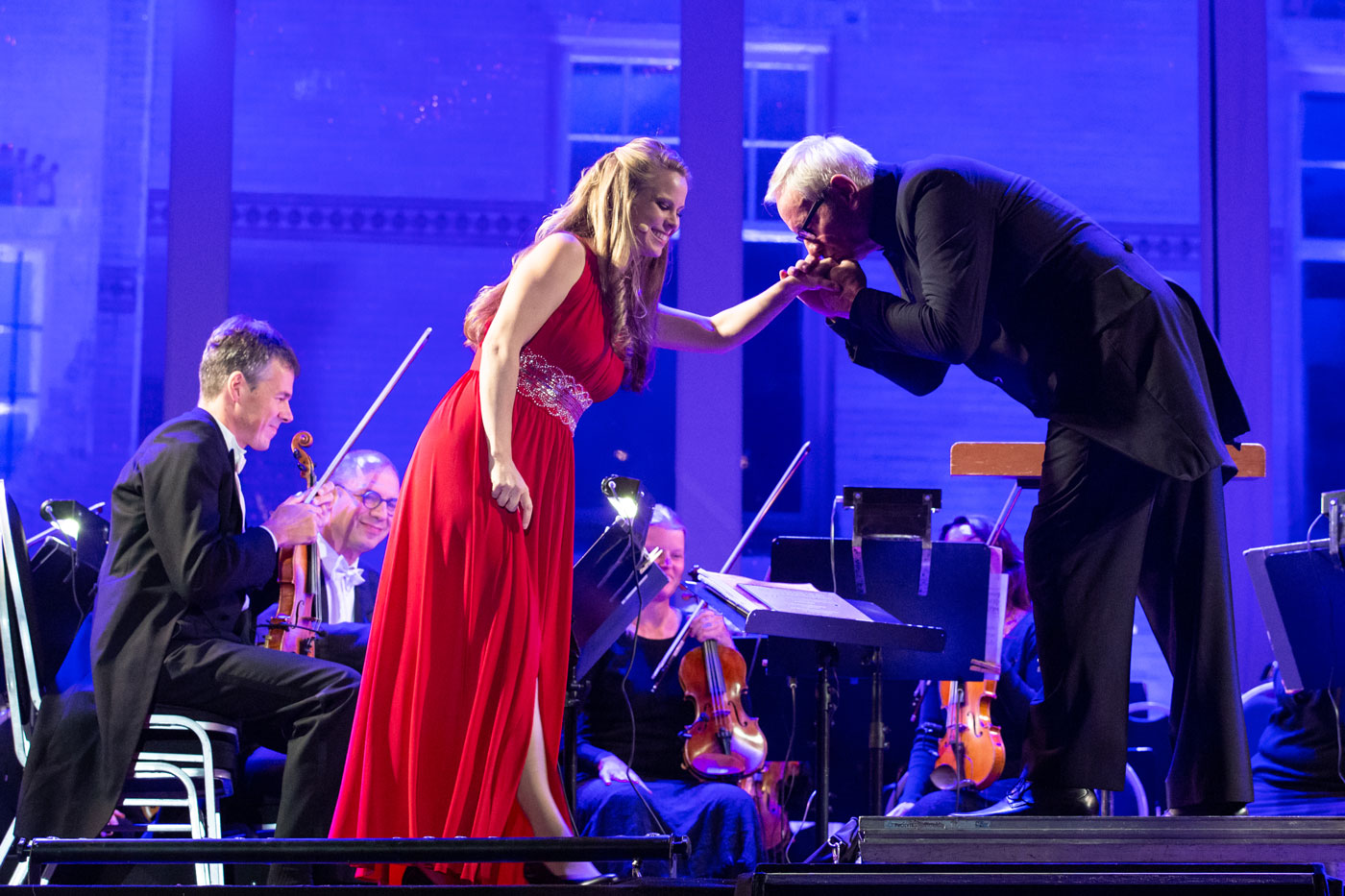
Amanda has made several striking realizations during these past couple of emotionally draining years. The first is this: There is no way to the other side of the pain except traveling straight through it. The second is equally important: There is no way her gift can ever be truly silenced. As she is discovering, human resiliency knows no bounds, and pain can often be channeled in powerful ways that touches others.
“In a funny way, it’s been a blessing in disguise because I’ve been filling my heart,” she said. “I feel called by God to bring spirituals to people in a different way.”
In response to that call, Amanda combines spiritual songs such as “Give Me Jesus” and “Were You There?” with an operatic emphasis, singing timeless lyrics in a new way to connect people with one thing everyone needs: hope.
In 2022, she was invited to perform the soprano solo during Brahms’ “Requiem” with the Lubbock Symphony Orchestra at Lubbock’s First United Methodist Church, where she also sang “O Holy Night” at a Christmas Eve service.
“It was my first concert with orchestra in three years,” she said of the soprano solo. “It was a big deal for me because I used to sing with an orchestra all the time, and it would have been just like singing in one of those 200 cathedrals, something I had done so often.
She also reached out to Dolter after returning and is slowly rebuilding her performer’s life.
“She emailed me after the accident,” he said. “That was a horrible thing that happened, but I heard her sing a couple of months ago, and her voice was more beautiful than it has ever been with more power and more persuasion than it’s ever had.”
Make no mistake, it was not easy, and despite the hardship and heartbreak, she has never regretted that original decision to pursue her opera dreams with passion.
In this slowly unfolding second act, Amanda started by humming and then moved to singing. Then it was singing with a piano and then singing with an orchestra. She still suffers migraine headaches as a result of light and sound sensitivity, so the steps remain small, but every one taken is huge.
“Each week, I go to a chiropractor who adjusts my neck and then I do physical therapy, and I’m working with a functional neurologist for people with post-concussion syndrome,” she said. “I’m still dealing with things, but I’m slowly getting better. And that’s OK.”
Likewise, her faith is slowly coming along as one might expect from someone who had so much taken away in such a short time.
“The first few months, I was angry with God,” she said. “I was in denial, telling my opera company I probably just needed two more weeks and I’d be back and to just get another soprano to fill in for my concerts. All of a sudden, she had 20 concerts to do for me.”
Eventually, denial gave way to pragmatism.
“I decided to just sit with this and grabbed my Bible,” she said. “I couldn’t read for about eight months, so I just sat with it and prayed about it and slowly and surely, I started coming closer to God. It’s like being down in the dumps really, really low, and he’s there with you. He will start bringing you up out of that hole you’re in.
“God really worked on me during that time to mold me into a better person, the person he wants me to be, and he’s not done with me yet.”
Recitative
[rec·i·ta·tive] noun. A rhythmically free vocal style that imitates the natural inflections of speech and that is used for dialogue and narrative in operas and oratorios.
The next big milestone on Amanda’s calendar of progress came in early June when she joined the teaching faculty at the Matador Opera Workshop on the Texas Tech campus. As it could only fittingly be scripted, Dolter also worked the camp.
“I think it’s so cool that Dolter’s first opera was my first opera, and then we taught together at Texas Tech for his last opera,” she said.
Dolter also recognizes the significance of the moment.
“It’s hard not to get emotional about this,” he says, struggling a few moments for composure before continuing. “One of the things that makes me emotional is seeing my students doing well. To work with Amanda at the camp was very special. She is one of the best students I’ve ever taught. There is a great deal to appreciate about Amanda. I really, really love her and I am so glad that God brought us together.”
For Amanda, it’s meant the chance to share her gifts and talents with a new crowd of singers, offering practical insights and wisdom for those pursuing the dream she chased almost 20 years ago.
“They came in from all over, and I coached some wonderful young singers on, weirdly enough, Mozart’s ‘Magic Flute,’” she said. “I also trained them about marketing themselves and the business skills they need. You can’t just bring your voice; you need your entire skill set.
“That’s one of the reasons why I’m doing this – to get the chance to extend some hope to other people and encourage them that they can do this, too. If you have a dream, chase it. Even if you’re a little girl from Lubbock, Texas, and you want to go to Europe and sing in Germany, chase that dream because you can make it happen.”
Her husband has been amazed every step of the way.
“The thing with her is she just keeps on climbing, keeps on going,” Berry said. “You shouldn’t always look back, but you should look back once in a while to realize what your initial goals were and that you surpassed them. She is such an accomplisher that she sometimes doesn’t see all of those things.
“You can’t know where you’re going unless you look at where you’ve been and appreciate the here and now. I’m very proud of her, not just about this recovery process, but everything.”
Amanda is working to enlarge the visibility of her spirituals project to share her voice in new ways with new audiences.
“Singing those old hymns in ways they’ve never been heard before gives me so much hope,” she said. “And that’s what I want to bring to people now.”
She also is busy advocating for greater visibility of opera in Lubbock, especially since the addition of the majestic Buddy Holly Hall of Performing Arts and Sciences as a performing venue. She has also built a relationship with the local symphony and is exploring possibilities.
“Amarillo has an opera. Midland has an opera. Lubbock needs an opera,” she said. “I am on a mission to bring more opera to Lubbock, especially when we can do collaborations with the amazingly talented Lubbock Symphony Orchestra, Maestro David Cho and Ballet Lubbock.”
Love and enthusiasm for her craft continue to percolate within the daily rhythms of her life. More emphasis and intentionality are placed on the after than the before as far as the accident is concerned.
As Amanda reflects on these past few years, the sudden jostling and unexpected adversity that have been her regular and unwelcome companions, she has come to realize God also has been near all along.
“I always tell my friends and family the best gift I can give them is the gift of my voice,” she said. “God gave me this gift so I can be a blessing to others. Music can be very healing spiritually and emotionally, especially in times of need.”
And who would know that better than she? After all, she’s seeing a little more clearly now – where she’s been, where she is and where she’s going.
“It’s been such a journey,” she said. “I was in survival mode, but I know this: Hope and determination and grit, they make a big difference.”
Brava
[ brah-vah, brah-vah ] Interjection. Used in praising a female performer.

